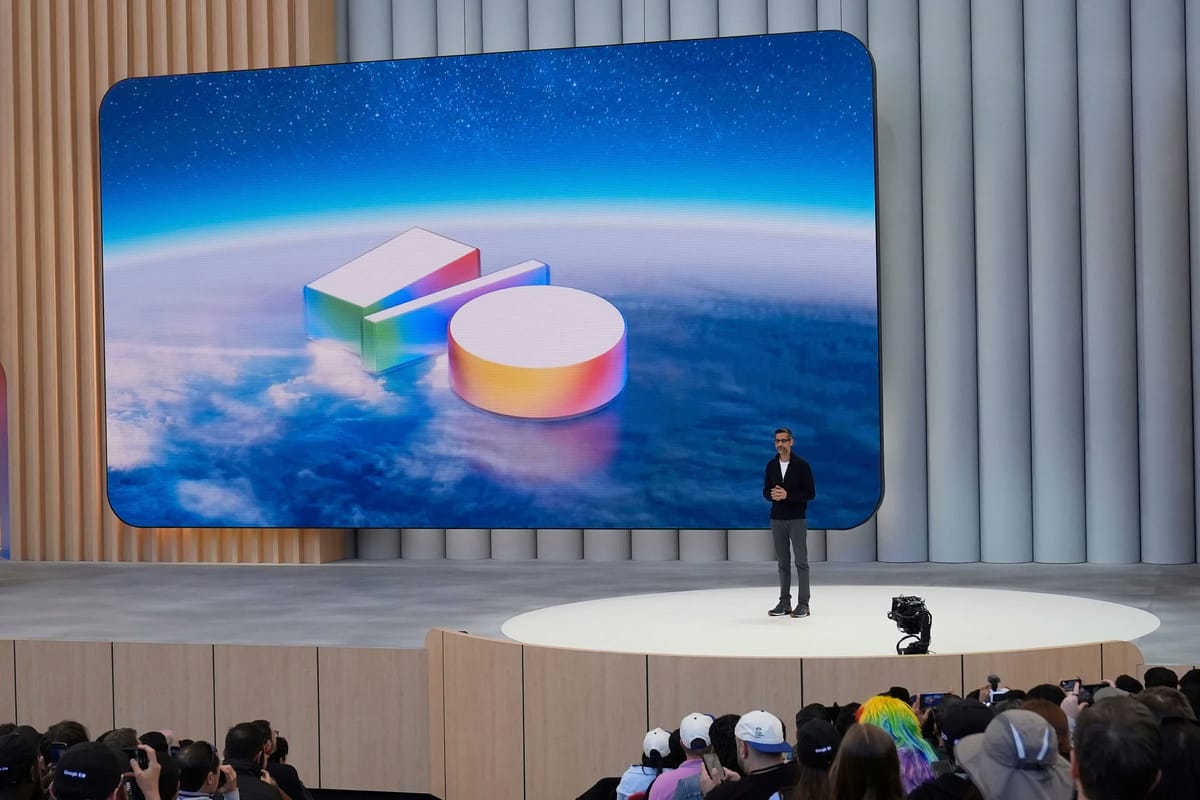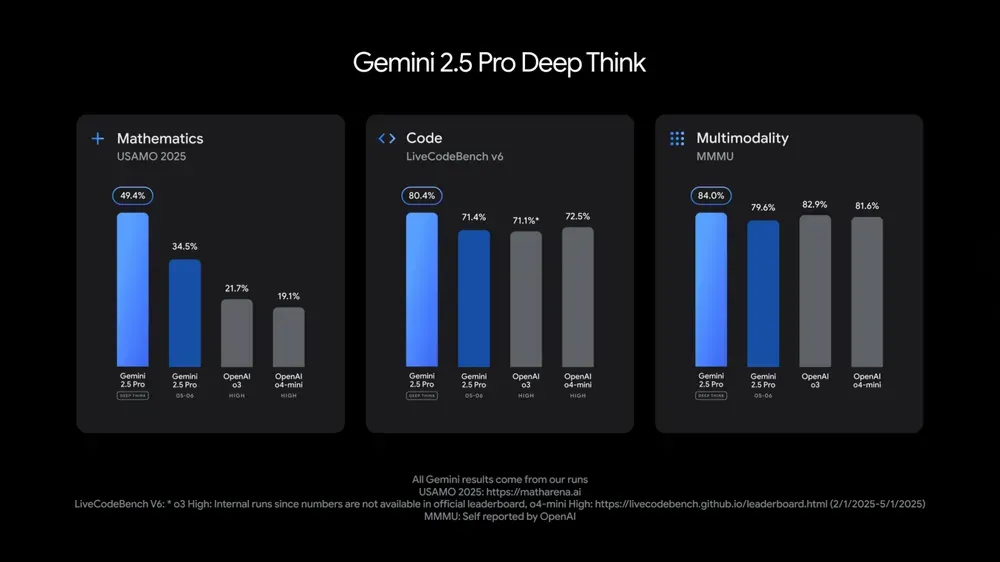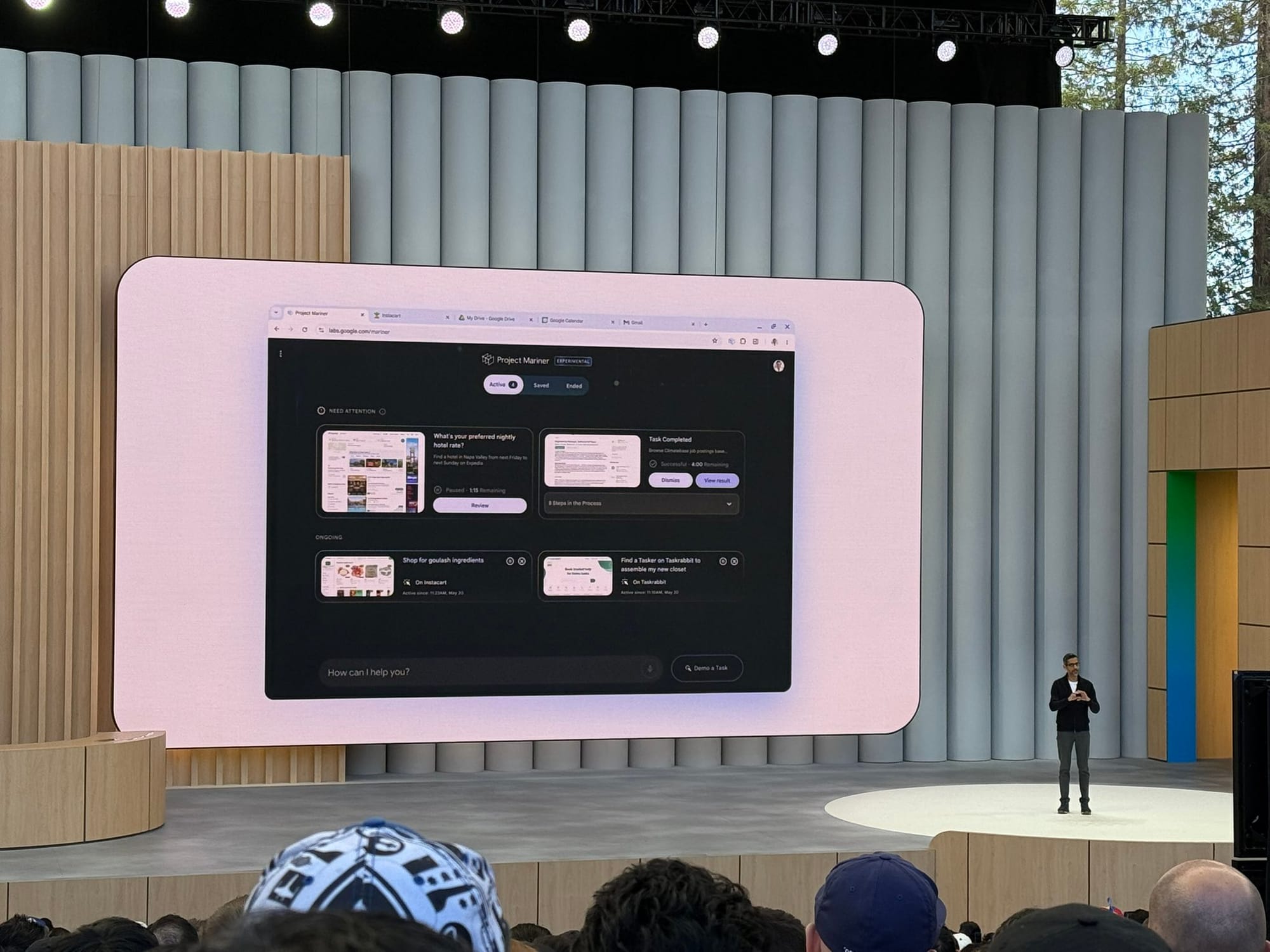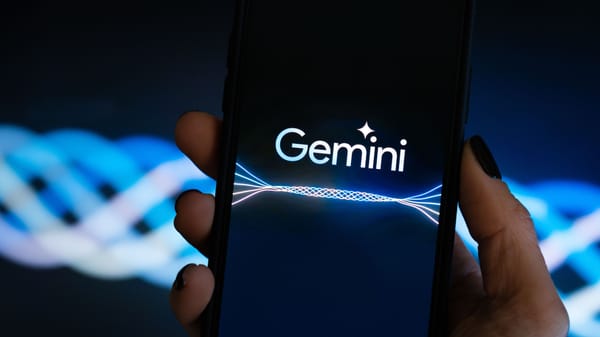9 Announcements Google Made at I/O 2025
Google unveiled Veo 3, an AI tool capable of generating videos with synchronised audio, and Flow, an AI filmmaking app

Google I/O 2025 was one of the company’s most impactful events in recent years, packed with major announcements that signal a bold leap forward in AI. From groundbreaking tools to powerful new models, Google showcased innovations that could solidify its position as a global leader in artificial intelligence.
Here are nine announcements Google made at this year's edition of Google I/O:
1. Gemini 2.5 Pro with Deep Think Mode
Google introduced Gemini 2.5 Pro, featuring "Deep Think" mode, enhancing the AI's reasoning capabilities by evaluating multiple solutions before responding.
This advancement aims to improve accuracy in complex tasks like coding and problem-solving.

"Through exploring the frontiers of Gemini’s thinking capabilities, we’re starting to test an enhanced reasoning mode called Deep Think that uses new research techniques enabling the model to consider multiple hypotheses before responding.
"2.5 Pro Deep Think gets an impressive score on 2025 USAMO, currently one of the hardest math benchmarks. It also leads on LiveCodeBench, a difficult benchmark for competition-level coding, and scores 84.0% on MMMU, which tests multimodal reasoning," Google said in a blog post.
2. AI Mode in Google Search
A significant upgrade to Google Search, the new AI Mode offers conversational, chatbot-like interactions. It includes features like Deep Search for in-depth research and AI-assisted shopping with virtual try-ons, aiming to rival platforms like ChatGPT.
(Video- Google)
Google is transforming search by integrating personal context—like Gmail, Docs, and YouTube history—directly into results. A new “Deep Search” feature runs hundreds of background queries per request. In essence, Google is shifting from indexing the web to indexing you, replacing the classic search box with AI agents that anticipate intent.
"AI Mode is our most powerful AI search, with more advanced reasoning and multimodality, and the ability to go deeper through follow-up questions and helpful links to the web," Google said in a blog post.
3. Gemini Live: The Next-Gen Assistant
Evolving from Project Astra, Gemini Live integrates camera, voice, and web data for real-time, intelligent task execution. It enables interactive, camera-based conversations on both Android and iOS devices.
"Ever wished you could just show what you mean instead of typing it all out? Or get real-time visual help with a tricky task, right from your phone? With Gemini Live, you can," Google said in a blog post.
"And in the coming weeks, Gemini Live will integrate more deeply into your daily life. Planning a night out with friends? Discuss the details in Gemini Live, and it instantly creates an event in your Google Calendar. Craving deep-dish pizza? Ask, and get the latest details from Google Maps," Google added.
Google is beginning to integrate services like Google Maps, Calendar, Tasks, and Keep, with plans to expand connections across its broader ecosystem. Users will retain full control and can manage these app connections and their personal information at any time through the app’s settings.
4. Veo 3 and Flow: AI-Powered Video Creation
Google unveiled Veo 3, an AI tool capable of generating videos with synchronised audio, and Flow, an AI filmmaking app.
Veo 3, its latest AI model for generating realistic videos. The new version goes beyond visuals, now incorporating audio elements such as sound effects, background noise, and even dialogue, aiming to create more immersive and lifelike content.
"Veo 3, our new state-of-the-art video generation model, not only improves on the quality of Veo 2, but for the first time, can also generate videos with audio — traffic noises in the background of a city street scene, birds singing in a park, even dialogue between characters," Google said in a blog post.
Flow, on the other hand, is a new AI-powered video tool for filmmakers, powered by Veo, Imagen, and Gemini.
It allows users to import or create characters and scenes, control camera angles, build scenes, and manage assets. Designed for broader accessibility, Flow expands on Google’s earlier video tool, VideoFX, with enhanced creative control.
Say goodbye to the silent era of video generation: Introducing Veo 3 — with native audio generation. 🗣️
— Google (@Google) May 20, 2025
Quality is up from Veo 2, and now you can add dialogue between characters, sound effects and background noise.
Veo 3 is available now in the @GeminiApp for Google AI Ultra… pic.twitter.com/7rcXeBslyU
5. Google Beam: 3D Video Calling
At the Google I/O keynote, Google introduced Beam, a next-generation 3D video communication platform aimed at making remote interactions feel like in-person conversations.
Evolving from Project Starline, Beam uses AI to convert 2D video into immersive 3D experiences. Some features, like real-time speech translation, are also coming to Google Meet.
Hi Google Beam👋! What started as Project Starline has evolved into a revolutionary 3D video communications platform. The combination of our AI video model and light field display allows you to make eye contact and read subtle cues as if you were face-to-face 🤯… pic.twitter.com/VlsIZz9Uzx
— Google AI (@GoogleAI) May 20, 2025
"Essentially, the idea is that a user would face a large screen with a bunch of cameras capturing different angles and tracking head movement "down to the millimeter" at 60 frames per second. The person on the other end of the chat is sat in front of the same kind of setup," Google said in a blog post.
6. Project Mariner: Autonomous Web Interaction
At Google I/O 2025, Google announced a wider rollout of Project Mariner, its experimental AI agent that browses and uses websites. Now capable of handling multiple tasks simultaneously, Mariner will be available to U.S. users on the $249.99/month AI Ultra plan.
Its features are also coming to the Gemini API and Vertex AI for developers.
Project Mariner introduces agentic AI capabilities, allowing users to automate various tasks like searches and purchases. This feature aims to streamline online interactions by enabling the AI to act on behalf of users based on set preferences.

7. Android XR and Smart Glasses Partnerships
At Google I/O, it announced that it envisions smart glasses powered by its Android XR operating system and Gemini AI model becoming seamless, always-available AI assistants.
In a blog post, the company revealed partnerships with eyewear brands Gentle Monster and Warby Parker to develop stylish, all-day wearable XR glasses, with plans to expand to more partners soon.
"Equipped with a camera, microphones and speakers, these glasses work in tandem with your phone, giving you access to your apps without ever having to reach in your pocket. And an optional in-lens display privately provides helpful information right when you need it," Google said.
Google Android XR Glasses 👓 Live Demo#GoogleIO pic.twitter.com/qoGK4rs2z4
— Ben Geskin (@BenGeskin) May 20, 2025
8. Real-Time Speech Translation for Google Meet
At Google I/O 2025, Google announced real-time speech translation for Google Meet, powered by a DeepMind language audio model. The feature translates spoken words into the listener’s preferred language while preserving voice, tone, and expression.
With low latency, it enables fluid multilingual conversations—ideal for global teams or families connecting across languages—making real-time group chats in different languages possible for the first time, according to Google.
Google Workspace apps also received AI-driven updates, including personalised smart replies in Gmail that mimic users' writing styles and real-time speech translation in Google Meet, facilitating seamless multilingual conversations.
9. Gemini Ultra Subscription Plan
Google introduced the Gemini Ultra plan at $250/month, offering premium access to advanced AI tools like Gemini 2.5 Pro with Deep Think Mode, Veo 3, Flow, and enhanced features in Workspace apps, targeting power users and enterprises.




